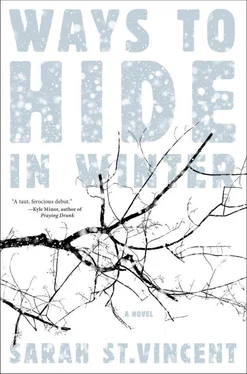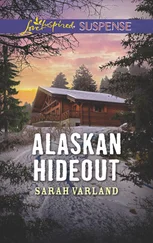I kicked a toe against the floorboards. “You must deal with a lot of disappointment.”
“Nope—almost never. In fact, I’ve found it’s not at all a bad way to go through life.” Picking up a bar, he seemed to hesitate. “You know, I know sometimes things happen that—I understand life gets tough sometimes. Believe me, I get that. But no matter what happens, I think it’s best to be able to trust other people. Without that…well, you lose yourself. You wind up doing things you regret. And I wouldn’t want to see that happen to someone like you.” His forehead wrinkled. “I think it would be something of a tragedy, actually.”
He put the bar back down, and I walked to the dumpster, the bag dangling from my hand. Heaving it into the yawning gap, I stood there, knowing I should thank him, unable to repress a shudder.
—
One day, not long before the end, I’d lost my mind.
Things hadn’t been so bad in the preceding weeks; it was early summer, warm, and the red, white, and blue bunting was still hanging in Carlisle where we’d gone to the Memorial Day parade a few days before. We’d sat on the sidewalk, watching the fire trucks and knots of Little League players and Girl Scouts go by, Amos holding my hand, people jabbering away happily in lawn chairs behind us, jumbo cups of iced tea in their hands. Some men in army and navy uniforms had gone by, waving, and Amos had waved back; they were his friends. “No one’s ever gonna throw me a parade,” he’d sighed, but when I’d glanced at him warily, he’d been smiling.
I’d smiled back, my lips closed, hovering above the scene in my imagination as I often did. Even though I’d left school, I couldn’t quite bring myself to think of myself as just another woman in cut-off shorts watching the parade in Carlisle, one whose future was written in the faces and bodies of all the other women around her. The light glinted on the great brass curves of the tubas, the cheerleaders’ pom-poms, the rows of children passing by, waving at people they knew in the crowd. Amos’s hand was solid and warm, anchoring me to the earth. I’d leaned against him, unsure how he would react, and to my relief, he’d put his arm around me. When the cheerleaders went by, I’d expected him to make some remark, but he didn’t, simply kissing me on the head. I’d felt myself relax. This was how I got through the days: by the hour, the minute, like a swimmer holding her breath. When viewed that way, things didn’t seem so bad. I could get by, I thought.
Then he lost his job.
Even though I hadn’t enjoyed being alone in the house all day, rattling from room to room, there had been a freedom that came with it, a freedom—at least within that small, closed sphere—to do what I pleased. With Amos home, sitting in the living room, staring out the window, I had to be careful all the time. I lost my moments of standing at the kitchen sink, looking at the fields. If I tried to do that, Amos would come up behind me, twisting my arm in a way he seemed to think was playful but hurt nonetheless. “What are you thinking about?” he would ask.
“Nothing,” I would say, and it was the truth. At those times, I was doing my best not to think, especially about the moment with the paring knife. It lay within me like a cold weight, like a certainty, but I never wanted to think about it again.
I’d had a friend in high school, a shy, heavy, soft-faced senior with long dyed-black curls that hung over the Led Zeppelin and Marilyn Manson T-shirts she always wore. She wasn’t my friend, really, although she might have been if things had turned out differently. She’d been in my gym class, and we’d always said hello to each other in the hallways; we must have sat together in the cafeteria a few times, too, because later I found that I could clearly remember her face, the way her eyes would crinkle as she listened to other people’s jokes and drank her chocolate milk. She wore rainbow-patterned bracelets made of string and had dimples when she smiled and was in the special-education classes, the ones for kids who didn’t exactly have anything wrong with them but were just slower than the others for whatever reason. We all knew she had a boyfriend, a stringy-looking guy in his thirties, and I must have met him at least once, at a party or something, because somehow I knew what he looked like even before they ran his picture in the newspaper. One night in the spring, he’d taken her into the woods, made her kneel by a creek, and shot her in the back of the head.
He had gone to jail—at least, I thought he must have gone to jail—and in the photos in the paper he’d had this look on his face, hollow-eyed and hunted and mean-looking, as if he couldn’t believe he were being persecuted this way. Maybe it was just the way the photo was taken, but looking into his eyes, his open mouth, was like gazing into some kind of horrible void.
I began to get the same sensation when I looked at Amos sometimes. Not always; until the very end, he had his days of kindness. But I began to think of my friend, to picture her sitting across from me in the cafeteria with her colorful bracelets and her chocolate milk, her elbows on the table, covering her face with her hand as she laughed.
He—her boyfriend—had shot her at the bottom of her skull, near the nape of her neck. The bullet had come out through the front. That’s what the newspaper had said.
Her face would have been gone when they buried her.
I tried not to think of this, but found that I couldn’t escape it. It often happened when I was looking in the bathroom mirror, lingering in the only place in the house where I could shut myself away and be alone. I would see her, and I would see myself seeing her, my eyes looking back at me from the glass. I would look away, but I could never quite escape it, that glimpse of myself that told me so much I would rather not have known.
“Why are you looking at me like that?” Amos asked once. Not angry, exactly, or at least not yet.
“Like what?”
“I don’t know. It’s sort of strange. You just look at me like I’m not even there.”
“I know you’re there.”
“Yeah?” To my surprise, he walked over to where I was sitting and leaned down to kiss me on the forehead. “You still love me?”
“Yes,” I said. “Of course I do.”
If he heard anything odd in my tone of voice, he didn’t let on.
One night not long after that, I had just pushed a casserole into the oven and was wiping my hands on a towel when Amos called to me from the living room.
“Come sit here,” he said.
I perched on the couch next to him, the TV murmuring in the background. Reaching for me, he began kissing me, sliding his hand inside my shirt. I let him do it, and, a few minutes later, I heard the sound of him unfastening his pants. I stayed where I was, knowing better than to move away, even though I was already beginning to worry about the food burning.
To my confusion, he then slid his belt free of its loops and, as I sat there, put it around my neck, looping the end with the holes through the end with the buckle. Then he sat back and pulled.
The leather tightened around my throat, and I moved toward him involuntarily. He moved farther off, sliding across the couch and pulling again, as if I were a dog on a leash. I slipped my fingers between the belt and my neck, trying to loosen it.
“Don’t,” he said. Then he stood up and tugged harder.
“Stop,” I said.
“Don’t you tell me to stop,” he replied, pulling again. I found myself on the floor, on my knees.
“It’s sexy,” he said. “I think it’s sexy.” Then he added, “You know I could kill you like this?”
I looked up at him, taken aback. Several long seconds passed while I knelt there, my hands at my throat, realizing for the first time—as if I had felt a tremor in the earth—what true fear was like.
Читать дальше












